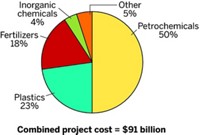Advertisement
Grab your lab coat. Let's get started
Welcome!
Welcome!
Create an account below to get 6 C&EN articles per month, receive newsletters and more - all free.
It seems this is your first time logging in online. Please enter the following information to continue.
As an ACS member you automatically get access to this site. All we need is few more details to create your reading experience.
Not you? Sign in with a different account.
Not you? Sign in with a different account.
ERROR 1
ERROR 1
ERROR 2
ERROR 2
ERROR 2
ERROR 2
ERROR 2
Password and Confirm password must match.
If you have an ACS member number, please enter it here so we can link this account to your membership. (optional)
ERROR 2
ACS values your privacy. By submitting your information, you are gaining access to C&EN and subscribing to our weekly newsletter. We use the information you provide to make your reading experience better, and we will never sell your data to third party members.
Business
Economic Woes Hit Chemical Trade
U.S. chemical exports decline due to drop in prices and global manufacturing slowdown
by Melody Voith
March 16, 2009
January trade data released March 13 by the Census Department suggest that the U.S. economy, which contracted 6.2% in the fourth quarter of 2008, is not gaining momentum in the first quarter.
Download Trade Data
U.S. International Trade In Goods And Services
(PDF Format, 49 pages, 402 KB)
Overall U.S. imports and exports both decreased in January, compared to December 2008. And because imports fell more than exports, the trade deficit narrowed. Exports of goods from the U.S. decreased $6.5 billion to $82.2 billion in January. Imports decreased $10.9 billion to $129.2 billion.
The chemical industry, excluding the pharmaceutical sector, also saw its trade deficit shrink compared to December, but the change was due to a roughly $2 billion drop in imports, while exports remained stable.
Compared to January of 2008, however, exports of chemicals dropped 30%, and imports fell 14.6%. T. Kevin Swift, chief economist at the American Chemistry Council, the U.S. chemical industry's main trade organization, traces the significant year-over-year decline in trade to lower prices and sinking demand for chemicals. "Prices of internationally traded chemicals peaked in the summer and have declined since," he says.
Those lower prices have not spurred demand for chemicals. Swift observes that the data reflect a collapse in international trade due to a "synchronized global recession." In contrast to the first half of 2008, when emerging markets boosted profits of U.S.-based firms, Swift says, now "the people we would export to are all in recessions, so that market has dried up, and their market here in the U.S. has dried up." Swift calls the example of Taiwan--where industrial production in January was down by 45% compared to last year--"sort of a shocker."
The only U.S. product that international buyers have shown interest in lately is the dollar. As more foreign investors and governments buy U.S. currency in their "flight to safety," the value of the dollar will increase compared to foreign currencies like the euro. But as Swift points out, the higher dollar will make U.S. exports more costly overseas and will likely cause the trade deficit to increase once again.




Join the conversation
Contact the reporter
Submit a Letter to the Editor for publication
Engage with us on Twitter